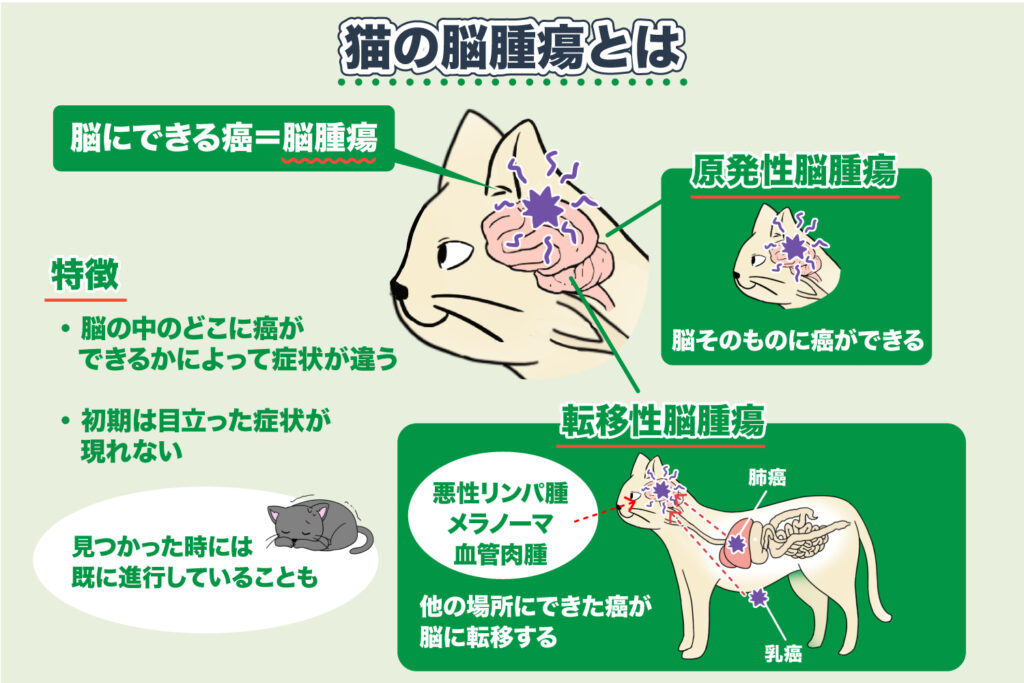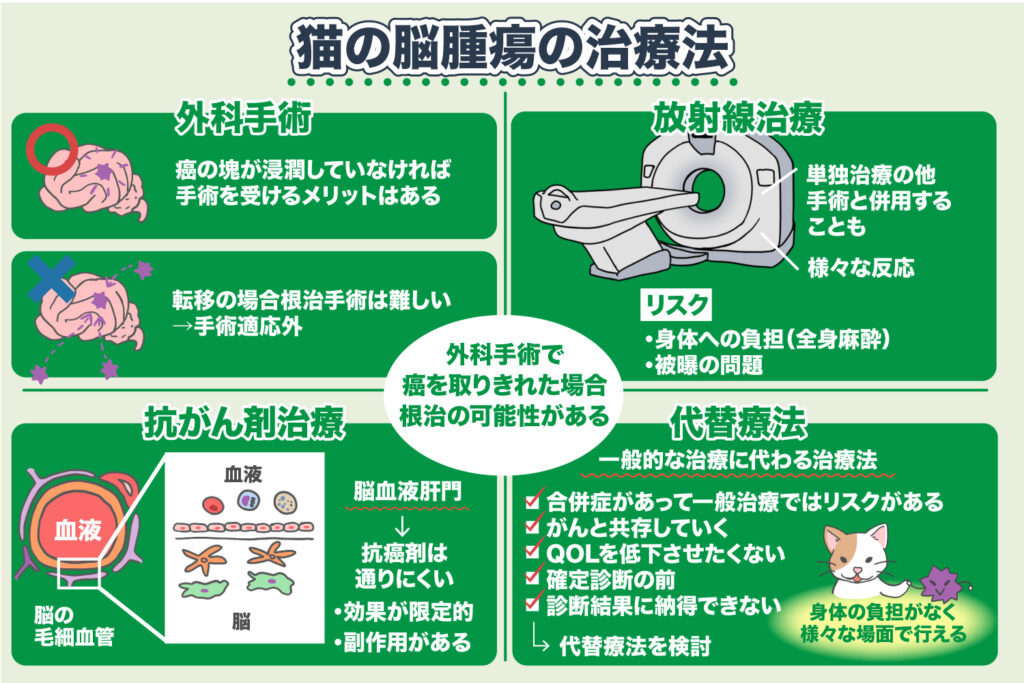There are two types of brain tumors in cats: primary brain tumors, which originate from the cells of the brain, and metastatic brain tumors, which spread to the brain from other organs. The symptoms vary depending on the location of the tumor. Seizures can occur. Generally, the prognosis for advanced cases is not good, but it is believed that engaging in immunotherapy can improve the condition, maintain the quality of life (QOL), and restore vitality and appetite. In fact, there are numerous cases where the immune measures taken with Cordy were able to control cancer in cats.
This page summarizes the causes, symptoms, treatments, and tips for improvement or cure of melanoma. It also introduces numerous case studies of improvement. We hope it serves as a source of support and a beacon of hope for everyone.
- Although the exact causes of brain tumors in cats are not well understood, cigarette smoke could be a potential cause.
- Treatments for brain tumors in cats include surgery, radiation therapy, medication, and alternative therapies.
- What can be done at home: increase the amount of protein and reduce carbohydrates in their diet.
目次
- 1 For Those Whose Beloved Cat Has Developed a Brain Tumor
- 2 What Is a Brain Tumor in Cats?
- 3 Causes of Brain Tumors in Cats
- 4 Diagnosis of Brain Tumors in Cats
- 5 Treatment of Brain Tumors—Brain Tumors in Cats
- 6 Alternative Therapy for Brain Tumors
- 7 When Your Cat Has a Brain Tumor: What You Can Do at Home – Dietary Therapy
- 8 Immune Support Without Strain on the Body
For Those Whose Beloved Cat Has Developed a Brain Tumor
Even if your beloved cat has developed a brain tumor, please know that with proper efforts, it is possible to coexist with or even overcome the brain tumor.
We hope this will be helpful for those whose cat has developed a brain tumor and is about to undergo treatment, those who are currently undergoing treatment, and those who have been told that further treatment is no longer possible.
What Is a Brain Tumor in Cats?

A brain tumor is a type of cancer that occurs in the brain.
There are primary brain tumors that originate in the brain, and metastatic brain tumors (or secondary brain tumors) where cancers such as breast cancer (mammary tumors) and malignant lymphoma spread to the brain from other parts of the body.
Melanomas (malignant melanomas) and angiosarcomas can also metastasize to the brain.
Symptoms vary depending on the part of the brain where the cancer develops. In the early stages, brain tumors may not exhibit noticeable symptoms, making it common to discover them only after they have progressed.
It is difficult to diagnose a brain tumor based solely on symptoms in cats, but if you notice unusual behaviors, it is recommended to consult a veterinarian as soon as possible.
Symptoms of Brain Tumors in Cats
When a cat has a brain tumor, the symptoms will vary depending on the part of the brain affected. Common symptoms include:
- Seizures: Symptoms similar to epilepsy
- Mental and personality changes: Becoming irritable, timid, or suddenly starting to meow loudly
- Eye changes: Inability to focus, vision impairment, strabismus, nystagmus (rapid eye movement)
- Neck twisting: Loss of balance causing the neck to remain twisted in one direction (dystonia)
- Circling or inability to walk or use stairs
- Changes in posture and gait: Walking tilted in one direction or staggering
- Changes in appetite: Sudden loss of appetite or increased appetite
- Loss of energy
- Weakness
- Difficulty hearing, leading to a poor response to sounds and voices
- Incontinence: Inability to control urination
- Loss of smell sensitivity
- Symptoms resembling dementia
Causes of Brain Tumors in Cats
Most brain tumors in cats are primary brain tumors, including meningiomas, gliomas, undifferentiated sarcomas, pituitary tumors, and glial cell tumors.
Metastatic brain tumors (secondary brain tumors) can result from angiosarcomas, lymphomas, lung cancers, mammary tumors (breast cancers), and melanomas (malignant melanomas) spreading to the brain.
Both primary and metastatic brain tumors are more common in older cats, just as other types of cancer typically occur in older cats.
Causes of Primary Brain Tumors
The exact cause of primary brain tumors is unknown.
Additionally, exposure to cigarette smoke (living with a smoker) may increase the risk. It is advisable for smokers living with cats to consider a designated smoking area.
Poor blood circulation and low body temperature can also make cancer more likely. Therefore, it is important to keep the cat’s body warm.
Diagnosis of Brain Tumors in Cats
Examination items include:
- Observation of symptoms
- Neurological examination
- Cerebrospinal fluid examination
- MRI scan
- CT scan
As previously mentioned, tumors (cancers) in the brain do not readily present symptoms in the early stages. However, as the cancer progresses, various symptoms may appear depending on the location of the tumor. By the time these symptoms are noticeable, the cancer is often already advanced.
It is recommended to regularly observe your cat’s behavior and condition. If you notice any differences over a few days, consult a veterinarian.
MRI and CT scans are expensive and sometimes require sedation. Therefore, it is recommended to discuss thoroughly with your veterinarian whether these tests are truly necessary.
Treatment of Brain Tumors—Brain Tumors in Cats

The treatments for brain tumors include the following:
- Surgery
- Radiation Therapy
- Medication (Anti-cancer drugs and steroids)
- Alternative Therapies
Surgery—Brain Tumors in Cats
Curative potential for brain tumors exists when the tumor can be completely removed through surgery. If the cancer forms a mass and has not invaded surrounding tissue, there is a possibility of long-term survival post-surgery, making the surgery worthwhile.
On the other hand, secondary brain tumors that have metastasized from other organs have cancer cells that have already entered the bloodstream or lymphatic fluid and are circulating throughout the body. Therefore, curative surgery (complete removal of the cancer) is challenging. Surgery may sometimes be performed for palliative purposes (for symptom relief), but in most cases, it is not considered appropriate (palliative surgery).
Radiation Therapy—Brain Tumors in Cats
This therapy can be used in combination with surgery or as a standalone treatment. However, individual responses to radiation vary, and because treatment requires general anesthesia, the burden of anesthesia on the body cannot be ignored.
For elderly dogs and cats, as well as those with lung diseases, the risks associated with anesthesia increase, necessitating careful consideration.
Furthermore, radiation therapy presents the issue of radiation exposure, so repeated treatments are not feasible.
Chemotherapy—Brain Tumors in Cats
Chemotherapy may also be used to treat brain tumors in dogs and cats. However, the brain has a barrier called the blood-brain barrier, making it difficult for anti-cancer drugs to pass through, which limits their effectiveness. There are also side effects, so it is recommended to have a thorough discussion with your veterinarian regarding whether chemotherapy is truly necessary.
You, as the owner, have the best understanding of your cat’s condition.
Even if a veterinarian advises treatment, there are instances where the treatment leads to worsened health, increased discomfort, and suffering.
To ensure that such a situation does not arise, please take the initiative as the pet owner to decide whether to undergo treatment, not to undergo treatment, or to take a break for your beloved cat.
If you decide to undergo chemotherapy, you can expect an improvement in Quality of Life (QOL) by using Cordy for immune support and Placenta Extract from Japanese SPF pigs for liver and kidney care to mitigate side effects.
- About Chemotherapy Drugs Used in Cancer Treatment for Dogs and Cats – Side Effects, Precautions, etc.
- On Molecular Targeted Drugs Used in Cancer Treatment for Dogs and Cats
- Types and Protocols of Chemotherapy Drugs Used for Lymphoma in Dogs and Cats
- Minor Exposure to Chemotherapy Drugs – Be Cautious During Your Pet’s Cancer Treatment
- Why 90% of Chemotherapy Drugs Produce Side Effects
- I’ve Been Recommended Chemotherapy for My Dog or Cat, but What Are the Risks of Side Effects?
Alternative Therapy for Brain Tumors
As the name suggests, alternative therapy refers to treatments that serve as substitutes for surgery, chemotherapy, radiation, etc.
Many alternative therapies are less taxing on the body, allowing for multiple treatments to be combined simultaneously.
Since these therapies cause minimal damage to the body, they can be used irrespective of the disease stage or condition. They can also be employed to prevent recurrence before or after surgery, for cases where surgery is not an option, and even when the patient’s vitality is low.
Consideration for alternative therapy is particularly significant in the following cases:
- When complications make conventional treatments highly risky
- When aiming to coexist with cancer
- When prioritizing the avoidance of decreased quality of life (QOL)
- Before a definitive diagnosis is made
- When you feel uncertain about the diagnosis results
Alternative therapies can be administered alongside hospital treatments (such as surgery, radiation, or chemotherapy), potentially offering synergistic effects. It’s worth actively considering alternative therapies.
When Your Cat Has a Brain Tumor: What You Can Do at Home – Dietary Therapy

Diet is an everyday matter, and the health of our cats, just like us humans, is built upon what they eat.
Revising your pet’s diet = Improving their constitution.
First, review the daily diet to help maintain your pet’s immune strength.
The goals of dietary therapy are to slow the growth rate of cancer, build strength, and improve conditions like anemia and albumin levels.
Our company places a significant emphasis on a nutritional approach as the foundation of treatment.
Cancer growth requires carbohydrates (glucose). Thus, limiting carbohydrates as much as possible is an immediately actionable, low-burden approach without risks of side effects. However, dietary therapy requires cooperation from your entire family to be successful.
Feed your cat plenty of proteins such as fish, meat, tofu, and natto, while reducing foods high in carbohydrates.
While dietary changes alone can’t cure cancer, they can slow the progression by restricting the essential carbohydrate supply needed for brain tumor growth. Though it may require more time and effort than just feeding regular food, we hope you can start without worrying too much about it.
Diet for a Cat with a Brain Tumor
When your cat has a brain tumor, it is highly recommended to increase the amount of protein while reducing carbohydrates.
However, preparing meals can be challenging to sustain in the long term. To help reduce the hassle, we have created a food list. Please give it a read.
Even Pets Can Benefit from a Symbiotic Approach to Food – Ingredients to Fight Cancer
Immune Support Without Strain on the Body
When your cat suffers from a brain tumor and is elderly or has other health concerns precluding aggressive treatments, less invasive options are often necessary.
Cordy can be integrated in such cases without burdening the body, often allowing for a more peaceful daily life.
Using medications such as chemotherapy agents, steroids, or antibiotics can be concerning due to potential liver function decline.
To mitigate liver damage, combining withPlacenta Extract from Domestic SPF Pork may be beneficial.
In our laboratory, we are continuing research on whether administering Cordy can expedite immune recovery during periods of immunosuppression caused by surgery or chemotherapy.
I’m not sure how much it will respond, but there is a good chance that it will at least enhance appetite and regain energy.
Even for those whose liver values have already worsened, there are many cases where liver function improves within about a month if they take domestically-produced SPF pig-derived placental extract powder.
Additionally, since lung cancer is often accompanied by inflammation, it is thought that giving EPA/DHA-rich krill oil extracted from Antarctic krill, which has anti-inflammatory properties, can also be effective.
At our laboratory, we continue to research Cordy, which is expected to have immune-modulating effects, domestically-produced SPF pig-derived placental extract powder, which is expected to protect liver function, and krill oil, which is expected to have anti-inflammatory properties. If you have any questions, please contact us.
監修獣医師:林美彩 所属クリニック:chicoどうぶつ診療所

代替療法と西洋医学、両方の動物病院での勤務経験と多数のコルディの臨床経験をもつ。 モノリス在籍時には、一般的な動物医療(西洋医学)だけでは対応が困難な症例に対して多くの相談を受け、免疫の大切さを痛烈に実感する。
ペットたちの健康維持・改善のためには薬に頼った対処療法だけではなく、「普段の生活環境や食事を見直し、自宅でさまざまなケアを取り入れることで免疫力を維持し、病気にならない体づくりを目指していくことが大切である」という考えを提唱し普及活動に従事している。
所属:






